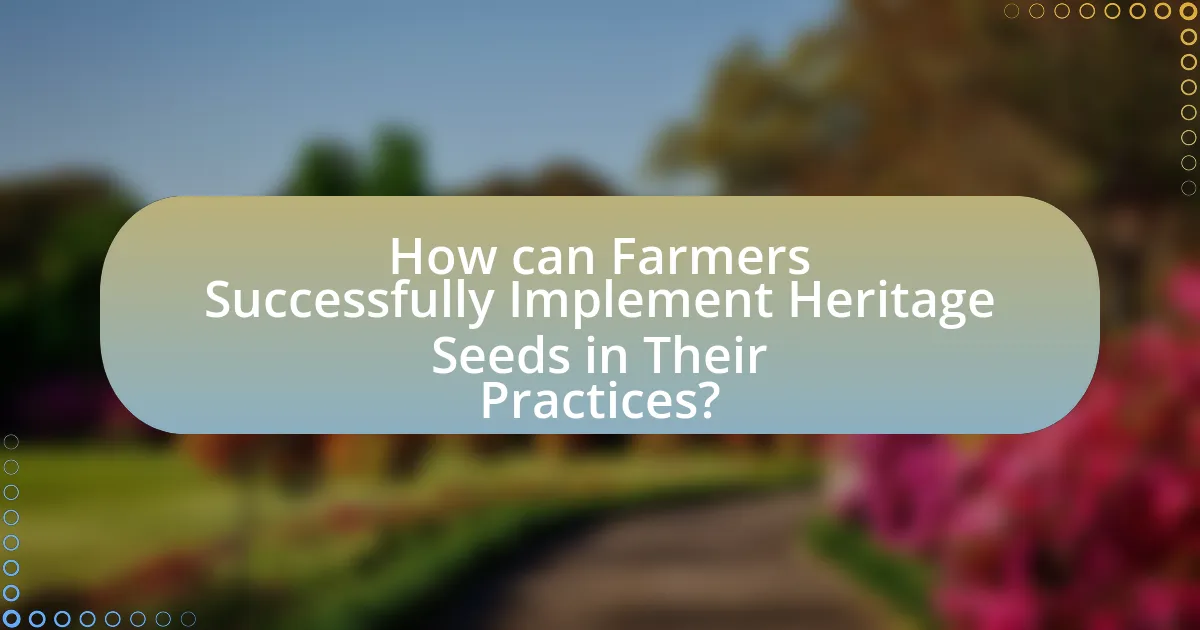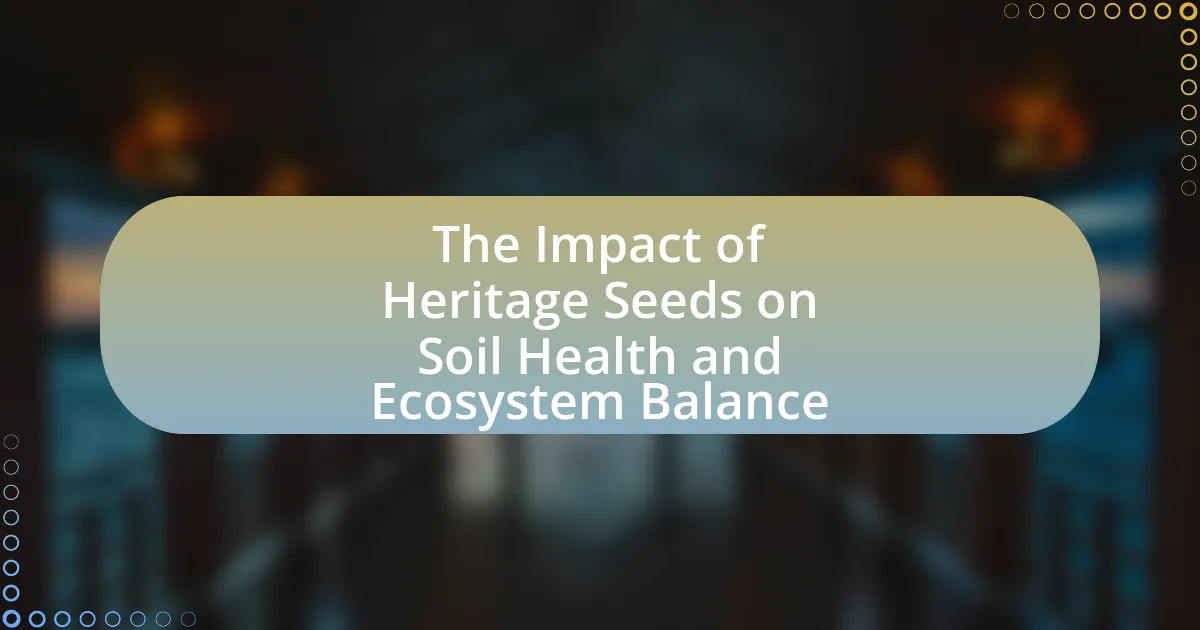Heritage seeds are traditional, open-pollinated varieties that have been cultivated for generations, known for their adaptability and resilience. This article explores the economic benefits of using heritage seeds in sustainable farming, highlighting their role in promoting biodiversity, enhancing soil health, and reducing reliance on chemical inputs. It contrasts heritage seeds with hybrid and GMO seeds, emphasizing their unique characteristics and advantages, such as lower input costs and higher market value. Additionally, the article discusses best practices for farmers, potential challenges in transitioning to heritage seeds, and available resources to support their adoption, ultimately underscoring the significance of heritage seeds in achieving sustainable agricultural practices.

What are Heritage Seeds and Why are They Important for Sustainable Farming?
Heritage seeds are traditional varieties of seeds that have been passed down through generations, often characterized by their adaptability, resilience, and unique flavors. These seeds are important for sustainable farming because they promote biodiversity, enhance soil health, and reduce dependency on chemical inputs. Research indicates that heritage seeds can withstand local pests and diseases better than modern hybrids, leading to lower pesticide use and improved crop yields. Additionally, the preservation of heritage seeds supports local ecosystems and contributes to food security by providing farmers with a diverse range of crops that can thrive in varying environmental conditions.
How do Heritage Seeds differ from Hybrid and GMO Seeds?
Heritage seeds differ from hybrid and GMO seeds primarily in their genetic makeup and breeding processes. Heritage seeds are open-pollinated varieties that have been passed down through generations, maintaining their genetic integrity and traits over time, while hybrid seeds are created through controlled cross-pollination of different plant varieties to produce specific traits, and GMO seeds are genetically modified using biotechnology to introduce new traits that do not occur naturally. Heritage seeds often exhibit greater biodiversity and adaptability to local conditions, which can enhance resilience in sustainable farming practices. In contrast, hybrid seeds may offer uniformity and higher yields, but they often require specific growing conditions and may not be as resilient. GMO seeds can provide benefits like pest resistance but raise concerns regarding ecological impact and food safety.
What characteristics define Heritage Seeds?
Heritage seeds are defined by their open-pollinated nature, which allows them to be naturally pollinated and produce seeds that are true to type. These seeds are typically heirloom varieties, meaning they have been passed down through generations, often for at least 50 years, and are valued for their genetic diversity, adaptability to local conditions, and unique flavors. The preservation of heritage seeds contributes to biodiversity in agriculture, as they are less susceptible to diseases and pests compared to hybrid varieties, which often require chemical inputs. This characteristic of resilience supports sustainable farming practices by promoting ecological balance and reducing reliance on synthetic fertilizers and pesticides.
Why are Heritage Seeds considered more resilient?
Heritage seeds are considered more resilient because they have been naturally selected over generations to adapt to local environmental conditions. This adaptability allows them to withstand pests, diseases, and climate variations better than many modern hybrid seeds. Research indicates that heritage varieties often possess a broader genetic diversity, which enhances their ability to cope with stressors, making them more robust in various farming conditions. For example, studies have shown that heritage crops can yield better in adverse weather compared to hybrids, demonstrating their resilience in sustainable farming practices.
What role do Heritage Seeds play in biodiversity?
Heritage seeds play a crucial role in biodiversity by preserving genetic diversity within plant species. These seeds, often heirloom varieties, maintain traits that are adapted to local environments and resist pests and diseases, which contributes to ecosystem resilience. According to the Food and Agriculture Organization, over 75% of crop diversity has been lost since the 1900s, highlighting the importance of heritage seeds in maintaining agricultural biodiversity. By cultivating these seeds, farmers can enhance soil health, promote pollinator populations, and support a wider range of species, thereby fostering a more sustainable agricultural system.
How do Heritage Seeds contribute to ecosystem health?
Heritage seeds contribute to ecosystem health by promoting biodiversity and enhancing soil fertility. These seeds are often well-adapted to local environments, which helps maintain a diverse gene pool essential for resilience against pests and diseases. Research indicates that diverse plant varieties can improve ecosystem stability and productivity, as seen in studies showing that polycultures, which include heritage varieties, yield better than monocultures. Additionally, heritage seeds often require fewer chemical inputs, reducing environmental pollution and fostering healthier soil microbiomes. This relationship between heritage seeds and ecosystem health underscores their importance in sustainable farming practices.
What are the implications of losing biodiversity in agriculture?
Losing biodiversity in agriculture leads to decreased resilience of ecosystems, which can result in reduced crop yields and increased vulnerability to pests and diseases. This decline in biodiversity diminishes the genetic variety necessary for crops to adapt to changing environmental conditions, ultimately threatening food security. For instance, the Food and Agriculture Organization (FAO) reports that over 75% of global food diversity has been lost since the 1900s, which has made agricultural systems more susceptible to shocks such as climate change and market fluctuations. Additionally, reduced biodiversity can negatively impact ecosystem services, such as pollination and soil health, which are crucial for sustainable farming practices.

What Economic Benefits do Heritage Seeds Offer to Farmers?
Heritage seeds offer significant economic benefits to farmers by promoting biodiversity, reducing input costs, and enhancing market opportunities. These seeds are often more resilient to local pests and diseases, which can lead to lower reliance on chemical inputs, thereby reducing overall farming costs. Additionally, heritage seeds can yield higher prices in niche markets, as consumers increasingly seek organic and locally sourced products. For instance, a study by the University of California found that farmers growing heritage varieties can earn up to 30% more per unit compared to conventional crops, demonstrating the financial advantages of adopting heritage seeds in sustainable farming practices.
How can Heritage Seeds reduce farming costs?
Heritage seeds can reduce farming costs by promoting biodiversity and resilience, which leads to lower input costs and reduced dependency on chemical fertilizers and pesticides. By using heritage seeds, farmers can cultivate crops that are better adapted to local conditions, resulting in improved yields without the need for expensive agricultural inputs. Research indicates that heritage varieties often require fewer resources, as they are more resistant to pests and diseases, thus minimizing the need for chemical treatments. Additionally, heritage seeds can be saved and replanted, eliminating the need for farmers to purchase new seeds each season, which further decreases overall farming expenses.
What are the long-term savings associated with using Heritage Seeds?
Using Heritage Seeds can lead to significant long-term savings primarily due to their resilience and adaptability, which reduce the need for chemical inputs and enhance crop yields. Heritage Seeds are often more resistant to local pests and diseases, resulting in lower costs for pesticides and fertilizers. For example, studies have shown that farmers using Heritage Seeds can save up to 30% on input costs over time, as these seeds are bred for local conditions and require fewer resources to thrive. Additionally, the ability to save seeds from one harvest for future planting further decreases costs, allowing farmers to avoid purchasing new seeds annually. This practice not only promotes economic sustainability but also contributes to biodiversity and soil health, reinforcing the long-term viability of farming operations.
How do Heritage Seeds impact input costs like fertilizers and pesticides?
Heritage seeds reduce input costs for fertilizers and pesticides by promoting biodiversity and resilience in crops. These seeds are often adapted to local conditions, which can lead to lower dependency on chemical inputs. Studies indicate that heritage varieties can exhibit greater resistance to pests and diseases, resulting in a significant decrease in pesticide use. For example, research conducted by the University of California found that farmers using heritage seeds reported up to a 30% reduction in pesticide application compared to those using conventional seeds. Additionally, heritage seeds often require less fertilizer due to their ability to thrive in diverse soil conditions, further lowering overall input costs.
What market advantages do Heritage Seeds provide?
Heritage seeds provide market advantages such as increased biodiversity, resilience to pests and diseases, and the ability to adapt to local growing conditions. These seeds often yield crops with superior flavor and nutritional value, appealing to consumers seeking quality over quantity. Additionally, heritage seeds can command higher prices in niche markets, as they are often associated with organic and sustainable farming practices. Research indicates that farms utilizing heritage seeds can enhance soil health and reduce dependency on chemical inputs, further contributing to sustainable agricultural practices.
How can Heritage Seeds enhance product differentiation?
Heritage seeds enhance product differentiation by offering unique genetic diversity and distinct flavors that are often absent in commercially available seeds. This genetic diversity allows farmers to cultivate crops that are better adapted to local conditions, resulting in products that stand out in the marketplace. For instance, heritage varieties can provide unique colors, shapes, and tastes, which appeal to consumers seeking specialty or organic products. Additionally, the use of heritage seeds can attract niche markets focused on sustainability and traditional farming practices, further differentiating products from mass-produced alternatives.
What is the consumer demand for Heritage Seed products?
Consumer demand for Heritage Seed products is increasing as more consumers seek organic and non-GMO options. This trend is driven by a growing awareness of the benefits of biodiversity and sustainable agriculture practices. According to a report by the Organic Trade Association, sales of organic seeds, which include Heritage Seeds, have seen a significant rise, reflecting consumer preferences for traditional varieties that offer unique flavors and resilience. Additionally, a survey conducted by the National Sustainable Agriculture Coalition indicates that 70% of consumers are willing to pay a premium for seeds that support sustainable farming practices, further validating the demand for Heritage Seed products.

How can Farmers Successfully Implement Heritage Seeds in Their Practices?
Farmers can successfully implement heritage seeds by integrating them into their crop rotation and selecting varieties that are well-suited to their local climate and soil conditions. This approach enhances biodiversity and resilience against pests and diseases, which is crucial for sustainable farming. Research indicates that heritage seeds often yield better results in specific environments due to their adaptation over generations, leading to improved crop quality and reduced reliance on chemical inputs. For instance, a study published in the “Journal of Sustainable Agriculture” highlights that farms using heritage seeds reported a 20% increase in yield stability compared to those using conventional seeds, demonstrating the economic viability of this practice.
What best practices should farmers follow when using Heritage Seeds?
Farmers should prioritize genetic diversity, proper seed selection, and sustainable cultivation practices when using Heritage Seeds. Genetic diversity enhances resilience against pests and diseases, while selecting seeds suited to local conditions ensures better adaptation and yield. Sustainable practices, such as crop rotation and organic fertilization, maintain soil health and promote biodiversity. Research indicates that farms utilizing Heritage Seeds can experience increased resilience and reduced input costs, contributing to long-term economic sustainability.
How can farmers ensure proper seed saving techniques?
Farmers can ensure proper seed saving techniques by selecting seeds from the healthiest and most productive plants, ensuring genetic diversity, and storing seeds in a cool, dry place. Selecting seeds from robust plants helps maintain the quality and resilience of future crops, while genetic diversity prevents vulnerability to pests and diseases. Proper storage conditions, such as using airtight containers and maintaining low humidity, protect seeds from deterioration. Research indicates that these practices can significantly enhance crop yields and sustainability, supporting the economic benefits of using heritage seeds in sustainable farming.
What are the recommended planting and cultivation methods for Heritage Seeds?
The recommended planting and cultivation methods for Heritage Seeds include selecting well-drained soil, ensuring proper spacing between plants, and practicing crop rotation. Heritage Seeds thrive in nutrient-rich, organic soil, which can be achieved through the addition of compost or well-rotted manure. Proper spacing allows for adequate air circulation and sunlight, reducing the risk of disease. Crop rotation helps maintain soil health and prevents pest buildup, which is crucial for the sustainability of farming practices. These methods are supported by agricultural studies that highlight the importance of soil health and biodiversity in enhancing crop yields and resilience.
What challenges might farmers face when transitioning to Heritage Seeds?
Farmers may face several challenges when transitioning to Heritage Seeds, including limited availability, lower yields, and a lack of knowledge about cultivation practices. Limited availability can hinder farmers’ ability to source these seeds, as Heritage Seeds are often produced in smaller quantities compared to commercial hybrids. Additionally, Heritage Seeds may yield less than modern varieties, which can impact overall productivity and profitability. Furthermore, farmers may lack the necessary knowledge and experience in growing these seeds, as they often require different management practices and may be more susceptible to pests and diseases. These challenges can complicate the transition process and affect the economic viability of adopting Heritage Seeds for sustainable farming.
How can farmers overcome potential obstacles in adopting Heritage Seeds?
Farmers can overcome potential obstacles in adopting Heritage Seeds by engaging in education and collaboration with agricultural organizations. Education programs can provide farmers with knowledge about the benefits and cultivation techniques of Heritage Seeds, which can enhance their confidence in using these seeds. Collaboration with agricultural organizations can facilitate access to resources, including financial assistance and technical support, which are crucial for transitioning to Heritage Seeds. Research indicates that farmers who participate in cooperative programs report higher success rates in adopting sustainable practices, including the use of Heritage Seeds, due to shared knowledge and resources.
What resources are available for farmers interested in Heritage Seeds?
Farmers interested in Heritage Seeds can access a variety of resources including seed banks, agricultural extension services, and online databases. Seed banks, such as the Seed Savers Exchange, provide a repository of heritage seeds and offer educational resources on their cultivation. Agricultural extension services often provide guidance on sustainable farming practices and can connect farmers with local heritage seed suppliers. Online databases, like the USDA’s National Plant Germplasm System, offer detailed information on the characteristics and availability of heritage seeds. These resources support farmers in adopting heritage seeds, which can enhance biodiversity and contribute to sustainable farming practices.
Where can farmers find reliable Heritage Seed suppliers?
Farmers can find reliable Heritage Seed suppliers through organizations such as Seed Savers Exchange, which specializes in preserving and distributing heirloom seeds. Additionally, local agricultural co-ops and farmers’ markets often feature vendors who offer heritage seeds. Research indicates that using heritage seeds can enhance biodiversity and improve crop resilience, making these suppliers crucial for sustainable farming practices.
What educational programs exist to support Heritage Seed farming?
Educational programs that support Heritage Seed farming include the Seed Savers Exchange, which offers workshops and resources for preserving heirloom varieties, and the Organic Seed Alliance, which provides training and research on organic seed production. Additionally, universities such as Cornell and UC Davis have programs focused on plant breeding and seed preservation, emphasizing the importance of heritage seeds in sustainable agriculture. These programs are designed to educate farmers on the benefits of biodiversity, soil health, and crop resilience, reinforcing the economic advantages of utilizing heritage seeds in sustainable farming practices.





